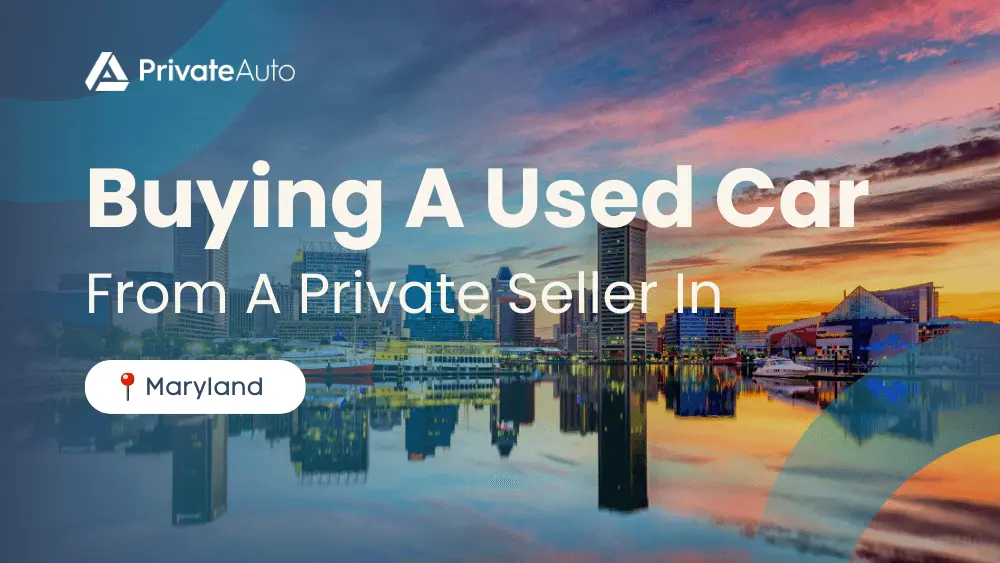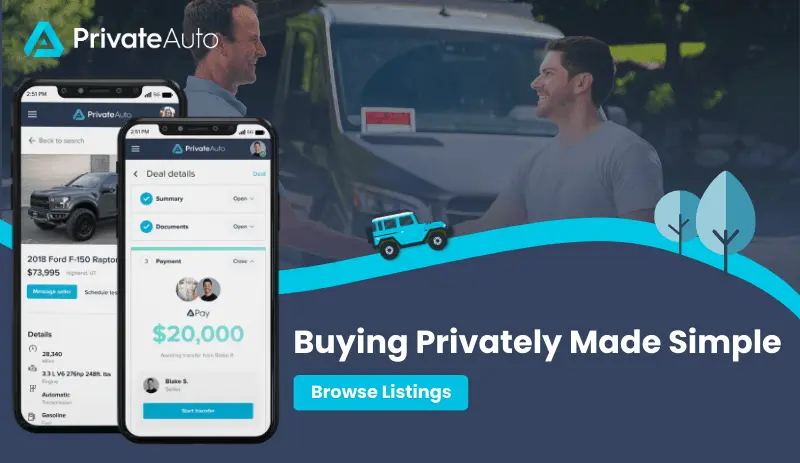When you buy a car from a private seller, you’ll need to handle some things that a dealership normally takes care of. PrivateAuto makes the pre-owned vehicle buying experience as smooth as a dealership transaction.
Find a car
Find a Car
Here are some of your options for finding a used car online:
- Auction websites such as eBay Motors and Bring a Trailer.
- Social media listings (e.g., cars for sale on Facebook Marketplace).
- Vehicle listing sites such as Autotrader.
- Online classifieds
b. National classifieds such as OfferUp.
These websites can be great a resource for finding your dream Ford F-150 XLT, but they fall short when it comes to the actual transaction. That’s why we call them “meetingplaces” instead of marketplaces.
We are the only transactional marketplace that offers self-serve technology solutions for every part of the deal. If you’d like to see how easy it can be, shop our used vehicles for sale and start the car buying journey.
While we are the best car-buying app, we don’t hate other listing sites. That’s why DealNow was created, a fast-track deal flow that allows you to start a deal on another platform and finish it with our transactional infrastructure.

Agree on a price
Get the Best Deal
While other websites require you to message the seller and have an awkward exchange PrivateAuto lets you make an offer with the click of a button. The seller can then accept, reject, or submit a counteroffer.
Take the car for a test drive
Research the Car
The two best ways to learn about a vehicle’s background are with a vehicle history report and researching the car’s title.
PrivateAuto provides a vehicle history report for all premium listings, for your peace of mind.
Here are some reasons vehicle history reports are good to have.
1. You know how well the car has been cared for.
2. You have visibility into any accidents or insurance claims.
3. You can see service records, major repairs, and other work.
A vehicle history report can help you steer clear of buying a faulty used car and help you identify the good ones.
Conduct Title Research
The best way is to use the National Insurance Crime Bureau website and research the title of a vehicle to protect yourself from fraud.
It doesn’t happen often, but sometimes sellers will attempt to mislead or outright deceive. For instance, they may try to pass off a salvage title as clean.
Good title research will help you check for:
1. Reports of the car having been stolen
2. The car has been declared a total loss in an insurance claim
3. An outstanding lien (or lien release)
Just ask the seller for their full name and the vehicle identification number (VIN) in advance of meeting up. Run the title check, and have one less thing to worry about.
Handle paperwork
Documentation
1. Certificate of title
2. Emissions testing
3. Bill of sale
Maryland Certificate of Title
- Odometer disclosure
- Date of sale
- Purchase price
- Your hand-printed name and signature
- Seller’s hand-printed name, signature, and address (if there is more than one seller listed on the title, all sellers will need to sign)
Maryland Emissions Testing
- Anne Arundel
- Baltimore
- Carroll
- Calvert
- Cecil
- Charles
- Fredrick
- Howard
- Hartford
- Montgomery
- Prince George
- Queen Anne
- Washington
During the vehicle smog testing process, the MVA will conduct three tests.
1. Gap Cap Test, specifically designed for cars with model years between 1977 and 1995 weighing less than 8,500 pounds.
2. Onboard diagnostic test (OBD), specifically designed for model years 1996 and newer that weigh less than 8,500 pounds, and heavy-duty vehicles model years newer than 2008 and weighing between 8,501 and 14,001 pounds.
3. Tailpipe idle test, specifically designed for car model years between 1977 and 1995 that weigh up to 26,000 pounds, and heavy-duty cars with model years newer than 2008 that weigh less than 8,500 pounds.
In Maryland, the Vehicle Emissions Inspection Program (VEIP) test fee is $14. For those who use a self-service kiosk, the fee will be $10.
If your car fails the test, the first retest will be free.
Emission Check Exemptions in Maryland
Emissions test exemptions in Maryland are:
- Car models older than 1976 or vehicles weighing more than 26,000 pounds
- Diesel-powered or electric cars
- Historic/antique cars
- Hybrid vehicles
- New vehicles
- Cars owned by senior citizens over 70 years old or qualifying cars with mental disability tags
Maryland Bill of Sale
1. The car is less than 7 years old
2. You’re paying more than $500 below the bluebook value.
This document protects you by memorializing the terms of the sale, the VIN, the selling price, mileage, and the names and signatures of both parties. If the seller ever wants to contest the transaction or any part of it, you have their signature on a legal document with all of the terms and details to back you up.
PrivateAuto makes it easy with an official Maryland bill of sale in the mobile app. Both you and the seller review the details and then digitally sign after inspecting the car. No scanning or printing is needed. Everything is stored in your account as a reference.
Pay the seller
Pay for the Vehicle
We got tired of the limitations of existing payment methods, so we created PrivateAuto Pay.
Here’s how it works:
1. No exchange of contact or banking info.
2. No transfer fees.
3. Instantaneous transfers. Close the deal when you meet for the test drive.
4. Works 24 hours a day, 365 days a year. No coordinating around bank hours.
5. Good for transfers up to $1M.
6. Enjoy escrow-like safeguards without the expense and hassle of an actual escrow service.
Transfer ownership
Register the car
Get new license plates
Maryland Title Transfer and Registration
Here’s what you’ll need to provide when you visit your local MDOT office:
- The Certificate of Title, signed over to you by the previous registered owner
- Emissions inspection certificate (if applicable)
- Lien information (if applicable)
- Payment for the Maryland excise tax: 6% of the vehicle’s purchase price
- Payment for Maryland’s vehicle title transfer fee: $100
- Payment for Maryland registration fees: from $135 to $187
- Valid ID or driver’s license
- Proof of insurance
Read our complete guide to a Maryland title transfer for more info on the subject.
Should I Buy from a Dealer or a Private Seller?
Here at PrivateAuto, we’re big fans of the private seller route. Here are the advantages:
1. Get a better price by cutting out the middleman and going straight to the source. Dealers must buy low and sell high to make a profit and keep the lights on.
2. Avoid fees. Car dealers charge documentation fees that range from $50 to over $1,000.
3. You drive the deal on your terms. PrivateAuto allows you to make offers and negotiate the best deal directly with the seller.
4. In some states, buying from a private seller means no vehicle sales tax. For example, Arizona, Hawaii, and Nevada charge sales taxes on retail (dealership) vehicle purchases, but not private-party ones.
We believe in making private-party transactions as easy as buying a used car from a dealership. That’s what we’re all about.
Maryland Vehicle FAQ
Do you pay sales tax on a used car in Maryland?
Maryland calls their sales tax an “excise tax,” but it’s the same thing: a 6% tax on the purchase price or book value of a car. Unlike many other states, Maryland doesn’t have local sales taxes; 6% is the most you’ll pay in tax on your vehicle purchase.
Can you transfer ownership of a vehicle without a title in Maryland?
No, you will not be able to transfer ownership of a vehicle in Maryland without a title. Apply for a duplicate title (Form VR-018) if you have proof of ownership of the vehicle.
Can I drive a car I just bought without plates in Maryland
Under Maryland law, it is illegal to drive a car without any plates, even if it is registered. Driving a car home after purchasing, with no plates, will result in fines of around $70 plus court fees.
This is why it’s critical when buying privately that you and the seller visit an MDOT office together right after the sale. There you can get temporary 30-day tags, officially transfer ownership into your name, register the vehicle, and start the permanent plate process.
Where can I go to transfer a vehicle title in Maryland?
There are a few different MVA locations where you can transfer a car title.
1. Maryland Motor Vehicle Administration, Glen Burnie Headquarters
2. Maryland Motor Vehicle Administration, Loch Raven Office
For more locations, visit the Maryland MVA website.
How to request a duplicate vehicle title in Maryland?
If your car title is damaged, lost, or stolen, you can apply for a duplicate vehicle title online, by mail, or in person at your local MVA office.
If you are requesting a duplicate Maryland car title online, you will need the following:
– Vehicle title number
– License plate number
– Payment for the $20 replacement fee
If you’re applying for a duplicate vehicle title by mail or in person, you will need:
– A completed application for a duplicate certificate of title (Form VR-018)
– The damaged/mutilated title (if applicable)
– Valid ID
– Payment for the $20 duplicate vehicle title fee
Is car insurance high in Maryland?
Maryland has the fifth-highest cost of auto insurance. The average annual car insurance premium in Maryland is $2,127, which is higher than the national average of $1,424 per year.
Is it illegal to not have car insurance in Maryland?
Driving without insurance is a misdemeanor offense in Maryland. This means that if you are convicted, you will not only have to pay expensive fines but you may also be sentenced to jail or have your driver’s license revoked.
Who is exempt from Maryland car tax?
Here are some tax exemptions for used vehicle purchases in Maryland:
– Purchases made by the federal government, the state government, or a political subdivision of the state: this exemption applies to all vehicle purchases made by the federal government, the state government, or any political subdivision of the state. This includes purchases made by municipalities, school districts, and other government entities.
– Purchases by a nonprofit organization exempt from federal income tax: this exemption applies to all vehicle purchases by a nonprofit organization exempt from federal income tax. This includes organizations such as churches, hospitals, and charities.
– Vehicles purchased for religious, charitable, or educational purposes: this exemption applies to all purchases of vehicles for religious, charitable, or educational purposes. This includes vehicles that are used to transport people to and from religious services, to and from charitable events, or to and from educational institutions.
– Vehicle purchases for agricultural purposes: this exemption applies to all purchases of vehicles used for agricultural purposes. Vehicles used to transport livestock, to and from the farm, or to and from the market are included.
– Purchases of vehicles used for public transportation: this exemption applies to all purchases of vehicles used for public transportation. Vehicles used by public bus companies, taxi companies, and other public transportation providers are included.
– Purchases of vehicles for the use of a disabled person: this exemption applies to all purchases of vehicles used by a disabled person. Vehicles specially designed for people with disabilities, such as wheelchair-accessible vans, are included.
Further Reading
What are the most common escrow scams?
What is the best place to buy a car online?
What fees are there when buying a used car?
How to pay for a car in cash on a weekend?
Questions to ask when buying a car
How long does it take to get plates in the mail?
What are the cheapest ways of buying a car?

Dana Marchlowitz
Contributing Author
Dana is a seasoned executive with a strong background in startups and product management. Currently serving as the Chief Product Officer for PrivateAuto, Dana brings a wealth of knowledge and expertise to the role….

